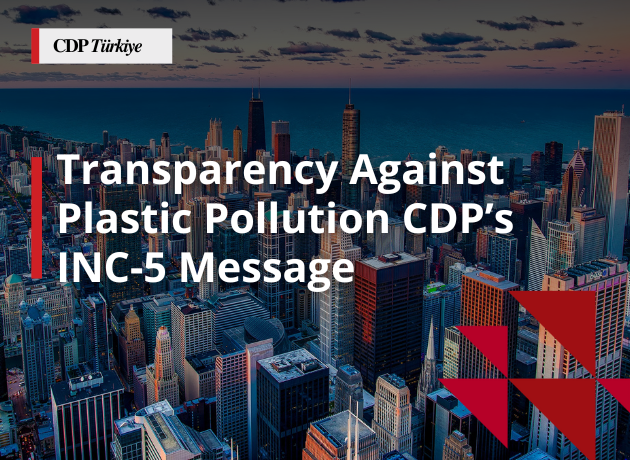
Submitted by sude.figen on December 16, 2024
At INC-5, CDP Takes New Steps in Combating Plastic Pollution
CDP participated in the fifth session of the Intergovernmental Negotiating Committee (INC-5), which aims to develop an international agreement to combat plastic pollution. The negotiations took place in Busan, South Korea. Although no consensus was reached on a legally binding instrument during these critical talks under the United Nations Environment Programme (UNEP), significant steps were taken. The session discussed limiting plastic production; however, plastic-producing countries opposed this idea, suggesting waste management as an alternative solution.
The INC Process and Previous Developments
Efforts to establish a global agreement against plastic pollution began in 2019 with international negotiations. The United Nations Environment Assembly (UNEA) laid out a roadmap to address plastic pollution in 2019, accelerating the process with negotiations starting in 2021.
- INC-1 (2021): Initial discussions on fundamental principles and the necessity of a legally binding international agreement on plastic pollution.
- INC-2 (2022): Concrete proposals for combating plastic pollution were introduced, and discussions on a framework for legal bindingness were held.
- INC-3 (2023): Proposals for international plastic management took shape with increased participation, addressing issues such as financing, technology transfer, and circular economy.
- INC-4 (2023): Detailed studies on measures against plastic pollution and discussions on draft agreement texts were carried out.
INC-5 - Key Outcomes
Reducing Plastic Dependency:
Many private sector entities and civil society organizations called for a robust global agreement to combat plastic pollution. However, companies producing plastics demonstrated reluctance to take concrete steps.
Financing and Policy Development:
It was emphasized that financial mechanisms and policy development processes must be accelerated to fight plastic pollution. Strengthening international agreements to ensure legal bindingness was also highlighted.
Reporting and Transparency:
Over 5,000 companies have reported their plastic impacts via CDP, marking a 90% increase compared to the previous year. However, widespread adoption of such reporting is crucial to ending plastic pollution.
Corporate Transparency in Tackling the Plastic Pollution Crisis
Through its environmental reporting system of 25 years, CDP enables companies to measure and report their impacts and risks related to plastic use. During the INC-5 sessions, CDP emphasized that corporate reporting on plastics should be a cornerstone of a new legally binding international agreement (ILBI). According to CDP, transparency not only helps companies manage risks but also fosters innovative solutions and accelerates capital flow towards a circular economy.
Growing Demand for Change from the Private Sector
One of the most significant messages from INC-5 was that a bold and ambitious plastic agreement is now being demanded not just by civil society but also by the market. Despite awareness of regulatory and reputational risks, companies were found to be slow in taking concrete steps to reduce their plastic dependency.
Joint Efforts for Legal Bindingness and Transparency
CDP, along with 37 companies, 49 financial institutions, and 214 organizations, called for mandatory corporate reporting on plastics to be included in the ILBI text. Such reporting is vital for supporting national performance reporting and policy development in combating plastic pollution.
CDP announced its commitment to continue its efforts for an effective and ambitious global plastic agreement during the next phase, INC-5.2.
For more information, visit the CDP Plastics Reporting page: CDP Plastics Reporting
Access the CDP INC-5 Policy Brief here.





